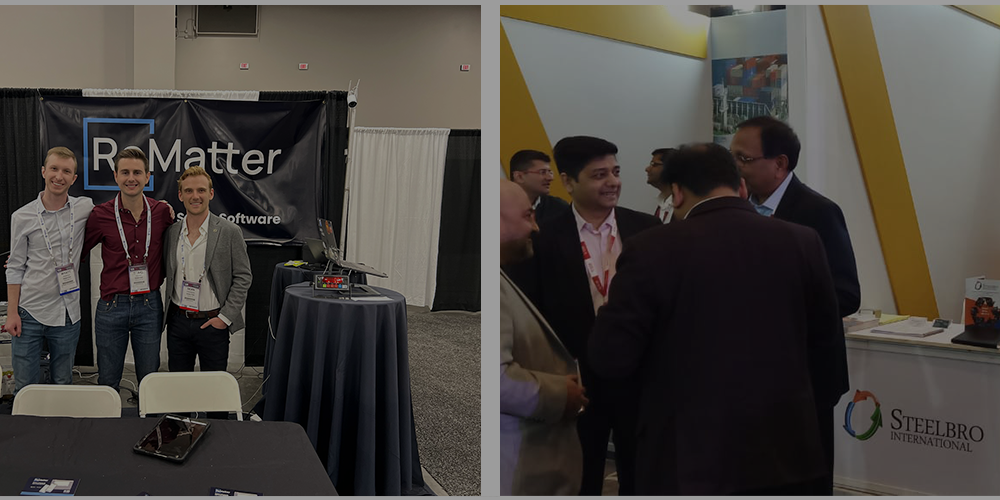The COVID-19 pandemic found Drake Hougo and his ReMatter co-founders in an interesting predicament. They launched the start-up company that creates digital tools for the recycled materials industry in March 2020, just as the pandemic began to sweep across the U.S. During the period of crisis and shutdown, as people sought digital opportunities to reconnect and build a path back to semi-normalcy, the ReMatter team was exploring how digital opportunities could not only reconnect the industry but take it a step further.

Photo Credit Courtesy of Drake Hougo from ReMatter.
“Through our research, we found a lot of manual processes in the recycled materials industry,” Hougo says. “From a software standpoint, we found a lot of space to make improvements to those processes. For example, a lot of recyclers spend a ton of time tracking inventory manually and needing to reference the physical size of the pile to know how much they have to sell. Dispatching was done using sticky notes on a whiteboard. Seeing these workflows helped us develop a product to streamline this work for recyclers.”
 Hougo and ReMatter aren’t alone in their forward-thinking efforts; young executives across the board are working to develop, build, and improve the recycled materials industry for future generations to come. Young leaders in the industry are aware of the achievements of their predecessors. Rather than keep business the same, these executives want to climb higher. “It’s easy to come in and continue the status quo,” says Abhijay Goenka, vice president of Steelbro International Co., Inc. “But you’re coming in standing on the shoulders of giants, you want to see further because of that. How can you add value to your company to take it to the next level? That’s what I’m working toward and what I hope to see all young leaders in the industry work toward.”
Hougo and ReMatter aren’t alone in their forward-thinking efforts; young executives across the board are working to develop, build, and improve the recycled materials industry for future generations to come. Young leaders in the industry are aware of the achievements of their predecessors. Rather than keep business the same, these executives want to climb higher. “It’s easy to come in and continue the status quo,” says Abhijay Goenka, vice president of Steelbro International Co., Inc. “But you’re coming in standing on the shoulders of giants, you want to see further because of that. How can you add value to your company to take it to the next level? That’s what I’m working toward and what I hope to see all young leaders in the industry work toward.”
Taking good to great
Whether they’re in a multi-generational family business or starting a new operation from scratch, young executives recognize the importance of understanding the current state of the industry. From working at his family’s company, for a decade, Eds Harding, vice president of operations at Harding Metals, says there’s no better way to gain that understanding than through boots-on-the-ground experience. “I think understanding and seeing the work all your employees do is critical to being an effective leader,” Harding says. “And it helps you do your own job too. It’s a lot harder to sell material without knowing or understanding what that material is, or how it gets processed. That experience gives you the full scope of your business.”
A full understanding of the business and industry allows young leaders to know the processes and structure that already work well and improve upon them. From his experience in the export markets, Goenka knows there’s room to build richer relationships with foreign markets, taking them from distant buyers to active partners. “We’re having conversations about what these markets are looking for, what does their industry look like, how are their processes different from ours, and how can we work together to best optimize our respective businesses,” he says. “All of that changes as our end markets continue to evolve and those businesses continue to grow.”
Digitalization and the workforce
Young leaders understand that employee recruitment and retention are vital to the future success of the industry Harding notes. “Make sure your employees know what they’re worth,” he says. “That the work they’re doing makes an impact not only on the day-to-day operations but also on our larger goals like reducing waste and protecting natural resources.”
Digitalization can be a key tool for employee retention by automating certain processes that give employees time to focus on other tasks and projects. Touring facilities gave Hougo and the ReMatter team the ability to design a product that helped companies do what they already do well by focusing on efficiency. “Our goal is to take things that are around the yard that are manual and can be automated and automate them so that employees can focus on more important concerns in the yard,” he says. “For an owner, that means you can run your yard even when you’re not physically there and have eyes on how everything is going operationally. We’re in a unique position to enable that workflow for the recyclers we’re working with via our iPhone/Android mobile apps and cloud-hosted web product.”

Photo Credit Courtesy of Abhijay Goenka from Steelbro International Co., Inc.
Digitalization can be an effective tool to enhance quality of life at work. “We’re in an interconnected world and there’s a lot of opportunities from a technological standpoint,” Goenka says. “There’s been a lot of movement toward digital transformation of business. How can we make the experience work in the industry — whether it’s someone in the facility or in the office become as efficient, smooth, and enjoyable as possible.”
Automation can help do just that, Hougo says. From a software perspective, automation can help augment workflows so employees can do their job quicker and focus better on other tasks. “If a buyer is spending a lot of time creating paperwork and managing orders, there’s less time to build relationships and call accounts,” he says. “Those are areas that can be improved with automation.”
Digitalization can also help improve quality of life through the expansion of remote work. “With the right tools you can make certain roles into remote positions,” Hougo adds. “That’s a really great way to attract and keep talent, they’re figuring out how to restructure roles around the facility so you may not need to come into the office. As the fourth and fifth generation of recyclers are coming into their own and working on ways to improve, digitalization has a big part to play. And part of that is a big focus on how to build a good company culture — if you have good culture, people will stay longer and encourage lifetime employees.”
Photo Credit Courtesy of Drake Hougo from ReMatter and Abhijay Goenka from Steelbro International Co., Inc.










